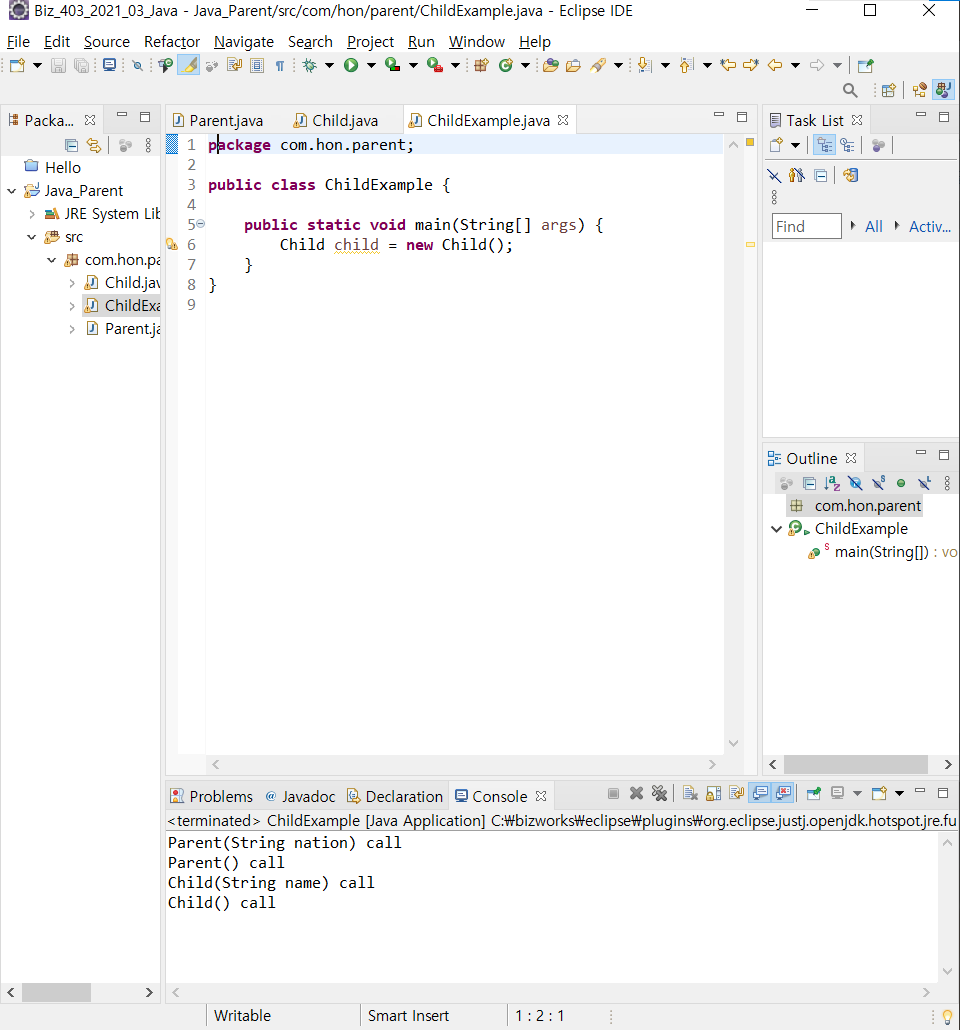2주차 미션
- p.330 문제 5번 실행 결과 인증 화면 캡쳐하기
- 객체 지향 프로그래밍의 개념을 정리하기
1. 문제 실행 결과 인증 화면

- 부모클래스 Parent
public class Parent {
public String nation;
public Parent() {
this("홈 스윗 홈");
System.out.println("Parent() call");
}
public Parent(String nation) {
this.nation = nation;
System.out.println("Parent(String nation) call");
}
}상속이 되는 부모 클래스로 Parent()생성자가 먼저 실행,
안에 있는 this로 Parent(String nation)이 실행되고
필드에 있는 nation에 매개변수 nation으로 초기화 해준다.
- 자식 클래스 Child
public class Child extends Parent{
private String name;
public Child() {
this("Corgi");
System.out.println("Child() call");
}
public Child(String name) {
this.name = name;
System.out.println("Child(String name) call");
}
}실행은 Parent 클래스와 같이 생성자에 매개변수로 필드 변수를.
하지만 Parent 클래스를 상속 받기 때문에
Parent의 생성자가 먼저 실행 후 다음으로 실행이 된다.
- main
public class ChildExample {
public static void main(String[] args) {
Child child = new Child();
}
}Parent 클래스를 상속받은 Child 클래스를 child로 인스턴스를 만들게 되면

부모클래스 -> 자식클래스 순서대로 실행이 된다.
2. 객체 지향 프로그래밍의 개념
OOP (Object Oriented Programing)
: 특정한 개념의 함수와 자료형을 함께 묶어서 관리
- 특징
- 추상화
: 공통적인 특징을 하나의 집합으로 만들어 내는 것 - 캡슐화
: 다른 객체에 자신의 정보를 숨기면서 외부의 접근을 제한하며 보호 가능 - 상속
: 부모 클래스의 필드와 메소드를 자식 클래스에서 사용할 수 있도록 하는 것 - 다형성
: 부모 클래스의 메소드를 자식 클래스가 overriding해서 자신의 역할에 맞게 활용
한 클래스 내에서 같은 이름의 메소드를 overloading 하는 것
- 추상화
- 클래스 (Class)
객체를 생성하기 위한 필드와 메소드가 정의되어 있는 자바의 설계도 - 객체 / 인스턴스 (Objects)
클래스로부터 만들어진 객체 - 메소드 (Method)
객체의 동작에 해당하는 코드
학습 스케줄
- 월 : CH.6 복습
- 화 : CH.7~8 복습
- 수 : CH.9 복습
- 목 : CH.10 예외 처리
- 금 : CH.11 기본 API 클래스
- 토 : 전체 복습 및 코드 작성
- 일 : 혼공단 미션
